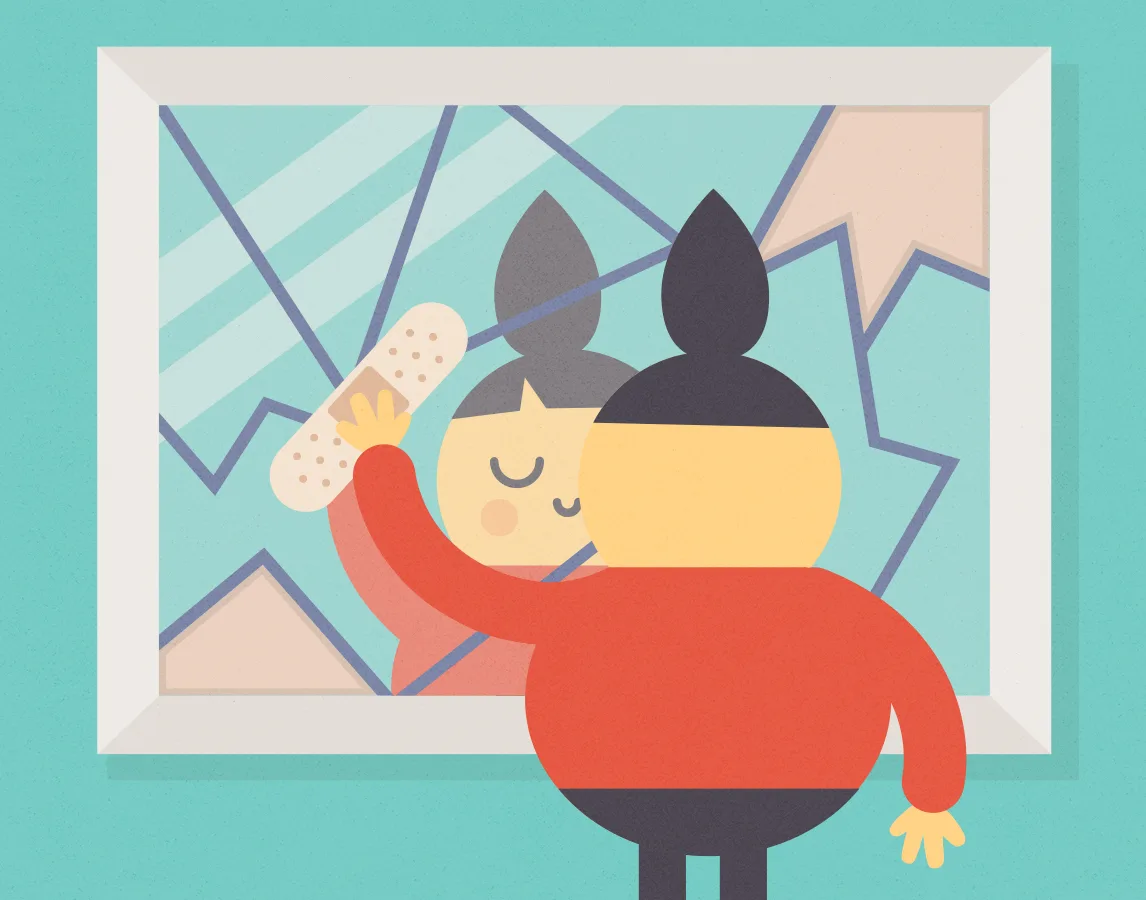4 easy ways to boost self-esteem (and 1 hard one)
Sherry Amatenstein
We are not born hating ourselves. We come into the world small and vulnerable, but instead of being given only love, warmth, and safety, we are sometimes bullied, neglected, abused, given minimal praise, affection, or interest, and/or are compared unfavorably to others.
The result is that we might start believing we do not deserve to be treated with respect and kindness. Once that belief takes hold, it can be hard to shake. Our negative habits can become so entrenched, we may overlook the damage it causes on our psyche. I’ve spent 10 years counseling people, many with very low self-esteem. When a patient comes into my office certain of only one thing—that they are unworthy—I do my best to challenge those beliefs and pave the way for a more realistic and positive self-image to form. Here are some steps to build new patterns.
Keep a negativity journal
Just as we wreck our physical health if we feed our bodies a diet of junk food, so too we damage our mental health if we offer our mind only negative thoughts. Many people have a running commentary of dysfunctional thoughts. These thoughts are background noise barely registering on a conscious level but they cultivate self-hatred nevertheless. I recommend that people prone to self-attack keep a journal, not necessarily to document each denigrating thought, but as a way to track how often negative thoughts arise.
Snap goes the rubber band
Once we become aware of an unhealthy psychological junk food habit I recommend that patients begin counteracting it. A simple but effective action is to wear a rubberband around your wrist. Each time you find yourself thinking something like, “I’m terrible at my job and my boss is going to fire me,” snap the rubber band. Then, replace the self-denigrating thought with a positive, nourishing one—something concrete, like “I’m great at my job or else my boss wouldn’t have given me a raise last month”. Snapping the rubber band can jolt you into suspending the negative thought train before you spiral further off-track. Refuting a negative pattern with a positive one may start you on the slow but essential journey toward positive self-regard.

Ask trusted loved ones what they value about you
When I ask patients suffering from low self-esteem to name a few traits they like about themselves, the majority struggle to come up with one or two. I often smile and inquire, “How many traits can you name that you don’t like?” Typically that list is endless. I once took part in an exercise during a human potential workshop where participants started by sitting in a circle and introducing themselves. Then, one by one, each person was given a pad and pen, and asked to move slightly outside the circle and turn their back—out of eyeshot but still able to hear everything said. People took turns saying nice things they’d observed about the person sitting outside the circle. Though the workshop was 15 years ago, I still have the list of accolades I wrote down: funny, pretty eyes, great laugh, good dresser, smart, kind. I tell my patients, “It was an ‘a-ha’ moment for me to hear these lovely things near-strangers had observed about me in a half-hour’s time, things I’d never have thought about myself because I was too busy being my own worst enemy … Sometimes it takes an outsider to help us realize the beauty inside ourselves.” I suggest patients perform a version of this exercise by emailing trusted friends and family with a request to share qualities they admire in this person. I emphasize that only people who are positive, not toxic, should be enlisted. At the subsequent session, I am usually presented with a rainbow of appreciative comments received: you’re so thoughtful, always bringing coffee even when I don’t ask; I’m always blown away by what a good mother you are; you’re so resilient, always bouncing back from setbacks. You’re a great listener. Understandably, my patients are shocked, often to the point of tears, at these revelations. I suggest they put these comments on post-its and sprinkle them around their home—on the refrigerator, desktop, bathroom mirror, nightstand. I say, “These traits, observed by others are real; verifiable. Let’s build from it. It would be a great idea to piggyback from this feedback and start compiling your own list of traits you like about yourself.”
Self-esteem is an inside job
Patients frequently tell me they start believing in themselves when they do something that earns recognition from others—preferably hundreds if not thousands of others. This is not a fair assumption. An external fix can only provide a brief self-esteem bump. Recently, I treated a patient who was struggling to complete a novel and kept criticizing herself for “lack of talent” and being a “genius procrastinator”. I said to her, “Can you close your eyes and imagine your book is a best-seller. How does it feel?” She followed my suggestion and beamed. “Now,” I said, “imagine your book is knocked off that list by another novel. How does that feel?” She sighed as tears squeezed out from beneath her closed lashes.
While it’s wonderful to feel acknowledged, no matter how many Facebook likes your post gets, these cyber-signifiers will never be able to fill the void inside. That is an inside job.
Focus on something outside yourself
People with a negative mindset often live inside their heads—berating themselves, comparing themselves unfavorably to others, running perceived past mistakes over and over in their heads. An analogy I use with patients is if they continue to stare at the floor of my home office, that is all they will see. But if they lift their eyes and peruse the room—noticing the bookshelves, gazing out the window—they might change their perspective. Succumbing to psychological ruts can have disastrous consequences while inner change can follow sustained outer action. This is why I suggest people put energy into something new, an activity they’ve always wanted to try, such as training to run a marathon or a cause or passion that excites them, like volunteering at an animal shelter or enrolling in a class. Performing an act of kindness for someone else is also performing an act of kindness for yourself. A study published in Clinical Psychological Science found that among the 77 study participants “helping behaviors were associated with higher levels of positive emotion and overall mental health.” So next time you help an elderly person across the street, know that you are you are getting as much if not more out of this small service as the one you are assisting.


Be kind to your mind
- Access the full library of 500+ meditations on everything from stress, to resilience, to compassion
- Put your mind to bed with sleep sounds, music, and wind-down exercises
- Make mindfulness a part of your daily routine with tension-releasing workouts, relaxing yoga, Focus music playlists, and more
Annual - billed at $69.99 USD/yr
14 days free
$5.83 USD/month
Monthly
7 days free
$12.99 USD/month

Meditation and mindfulness for any mind, any mood, any goal
- © 2024 Headspace Inc.
- Terms & conditions
- Privacy policy
- Consumer Health Data
- Your privacy choices
- CA Privacy Notice








